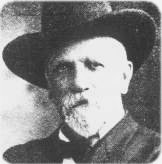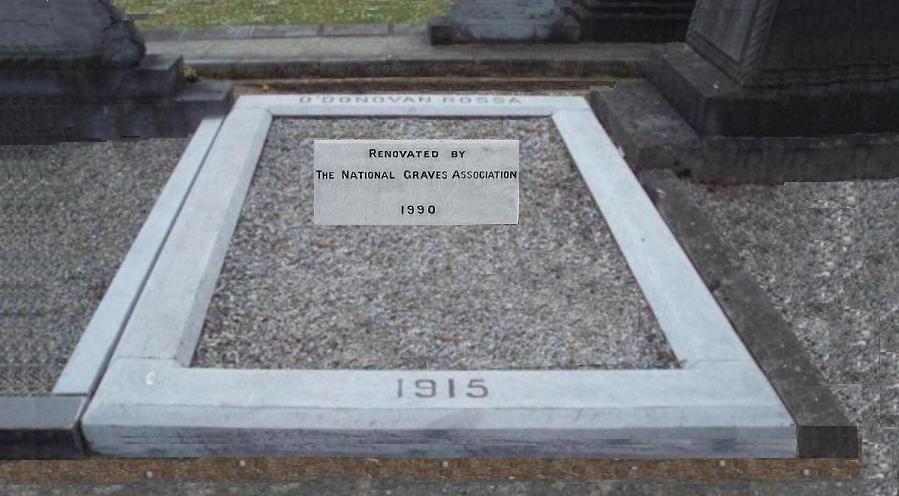|
Jeremiah O'Donovan Rossa (1831-1915)
 Jeremiah O'Donovan Rossa was born in Rosscarbery, County Cork on September 10, 1831 to Irish tenant farmers. At that time in Ireland, tenant farmers paid rent to absentee landlords who controlled 90% of the arable land. Most of the crops and livestock produced was being collected and sent to England in lieu of rent. As a consequence, the only means of subsistence left for the people was the lowly potato. When the potato crop failed in the mid1840's the people were left without their primary food source and their only means of paying the rent resulting tens of thousands of tenant farmers being evicted and left to wander the roads and crowd workhouses. Jeremiah O'Donovan Rossa was born in Rosscarbery, County Cork on September 10, 1831 to Irish tenant farmers. At that time in Ireland, tenant farmers paid rent to absentee landlords who controlled 90% of the arable land. Most of the crops and livestock produced was being collected and sent to England in lieu of rent. As a consequence, the only means of subsistence left for the people was the lowly potato. When the potato crop failed in the mid1840's the people were left without their primary food source and their only means of paying the rent resulting tens of thousands of tenant farmers being evicted and left to wander the roads and crowd workhouses.
Like many others of his time O'Donovan Rossa witnessed the devastation and squalor caused by what was in essence a contrived famine. That experience left him with an indelible resentment for the British and their unscrupulous landlords who let the people starve to death while ships loaded with wheat, oats, barley, mutton, lamb, pork, ham, beet, eggs, live cattle, sheep and pigs, and flour left Irish ports on a daily basis for England.
As a young man he moved to Skibbereen where he ran a grocery store. In 1856, at age 25, he founded the Phoenix National and Literary Society, a Irish nationalist group which aimed to remove the British from Ireland through any means necessary, including armed struggle.
In March of 1958, James Stephens, Thomas Clarke Luby, James Denieefe, Garret O Shaughnessy and Peter Langan founded the Irish Republican Brotherhood (IRB) in Dublin. shortly afterwards when Stephens visited Cork on a recruiting mission he met with Rossa who became one of his first recruits. Subsequent to that meeting the Phoenix Society morphed into the Irish Republican Brotherhood.
In December of 1858 O'Donovan Rossa was arrested for having organized a Phoenix Society demonstration. He was jailed without trial and spent eight month in Cork jail. He was released in July of 1859. In 1862 took over the running of the Fenian weekly newspaper the Irish People.
In 1865 when the office of the newspaper was raided O'Donovan Rossa, together with other members of the staff, was arrested, accused of plotting a Fenian rising, charged with high treason and sentenced to penal servitude for life. He was imprisoned in Pentonville, Portland and Chatham Prisons in England where, for eight years he suffered inhumane and cruel treatment at the hands of the prison authorities. In 1869 he was elected to Parliament for Tipperary but his election was declared void because he was imprisoned.
O'Donovan Rossa was amongst the Fenian prisoners released in the British government's general amnesty of 1870. Behind the "generosity" of the English was heavy pressure by the U.S. government to free the scores of former U.S. Army (and several Confederate Army) personnel, including generals and colonels. The U.S. government intervention was the result of Fenian instigated pressure, primarily in letters from John Savage to president Ulysses S. Grant.
The prisoners released were required to leave the country and not return until the term of their sentence had expired. Some of them went to Australia, but O'Donovan Rossa together with Charles Underwood O'Connell, John McClure, John Devoy, and Henry Mulleda who had been imprisoned together, came to America. The "'Cuba Five" named after the vessel they sailed on, arrived in New York in January of 1871 to a hero's welcome. Shortly after their arrival, the United States congress passed a resolution welcoming the "Cuba Five"' and their fellow Fenian prisoners to the nations capital. They were also received at the White House by President Ulysses S. Grant in a gesture of gratitude for the many Irish, including senior Fenians, who had served in his victorious Union Army.
O'Donovan Rossa settled in New York city where he became an active member of the American Fenian movement and editor of the New York edition of the United Irishman, an Irish Nationalist newspaper. By the time the Fenian Brotherhood disbanded in the early 1880, he had joined Clan na Gael, founded by New York Herald scientific reporter Jerome J. Collins in June, 1867 as a response to the feuding within the Fenian Brotherhood.
In December of 1875 O'Donovan Rossa established what was called a "skirmishing fund". With monies collected, he organised the first ever bombings of English cities by Irish Republicans in what became unknown as the "dynamite campaign". The campaign lasted through the 1880's and made him infamous in Great Britain. In 1885, Rossa was shot outside his office near Broadway by an Englishwoman, Yseult Dudley but, his wounds were not life-threatening. The British government claimed she was mentally unstable, and not acting on their behalf, although Rossa's supporters and even many of his detractors found this hard to believe.
For the remainder of his life Rossa remained the most visible Irish exile in America and an outspoken critic of the British occupation of Ireland. He wrote two books
Prison Life: Six Years in Six English Prisons published in 1874 and republished in 1882 as Irish Rebels in English Prisons and Recollections: 1838 to 1898, published in 1898
about his experiences in English prisons that
brought disgrace to the English penal system.
He appeared at speaking engagements all over the country relating his prison experiences, performing readings of his books and giving accounts of his involvement in the Fenian Brotherhood and his fight against the British.
He visited Ireland in 1894 and was given a patriot’s welcome. He visited again in 1904 when he was made a freeman of Cork City. A memorial to Rossa stands on Grafton Street in Dublin. Richmond Bridge over the River Liffey in Dublin was renamed O’Donovan Rossa Bridge in his honor. Skibbereen is home to the O’Donovan Rossa memorial park.
O'Donovan Rossa died in Staten Island on June 29, 1915 at age 84.
His remains were taken back to Ireland and buried in the Republican plot at Glasnevin Cemetery, Dublin. His funeral was attended by tens of thousands. Pádraic Pearse, soon to become a martyr in the 1916 Easter Rebellion, delivered the famous eulogy, concluding with the lines:
"They think that they have pacified Ireland. They think that they have purchased half of us and intimidated the other half. They think that they have foreseen everything, think that they have provided against everything; but, the fools, the fools, the fools! — They have left us our Fenian dead, and while Ireland holds these graves, Ireland unfree shall never be at peace."
Contributed by;
Tomás Ó Coısdealha
cemetery AND grave location
Name:
Glasnevin Cemetery PHONE NO. 011 353 1 830-1133
ADDRESS: Finglas Road, Glasnevin, Dublin 11, Ireland
GRAVE LOCATION: Republican Plot
GRAVE AND INSCRIPTION

|